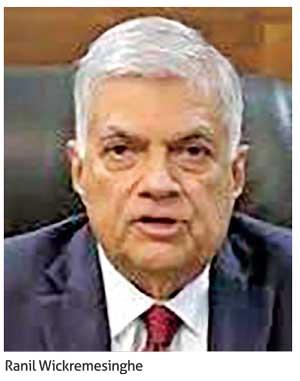Reply To:
Name - Reply Comment
By Indika Sakalasooriya
President Ranil Wickremesinghe yesterday said the world is keenly watching how Sri Lanka will recover from the “self-inflicted” economic crisis, the worst in its post-independent history, by negotiating with its creditors for financing assurances to unlock a bailout package from the International Monetary Fund (IMF).
 Wickremesinghe, who chaired the 55th meeting of the Asian Development Bank’s Board of Governors in Manila, Philippines, yesterday, highlighted the need for collaboration and cooperation among debtor nations, creditors and other partners to address the sovereign debt crisis in developing nations triggered by the pandemic and other negative geopolitical developments such as U.S.- China rivalry and Ukraine-Russia war.
Wickremesinghe, who chaired the 55th meeting of the Asian Development Bank’s Board of Governors in Manila, Philippines, yesterday, highlighted the need for collaboration and cooperation among debtor nations, creditors and other partners to address the sovereign debt crisis in developing nations triggered by the pandemic and other negative geopolitical developments such as U.S.- China rivalry and Ukraine-Russia war.
Wickremesinghe said Sri Lanka has embarked on “ambitious and comprehensive” economic reforms to address the imbalances in the economy and at the same time is doing the utmost to protect the vulnerable, who are severely affected by these “deep and painful” reforms.
“We have stabilised the economy. It is our hope and expectation that Sri Lanka’s creditors will support our efforts to restore the country’s debt sustainability,” he said.
After defaulting on its debt for the first time in its history in May, Sri Lanka secured an IMF staff deal for a 4-year, US$ 2.9 billion Extended Fund Facility (EFF) on September 1.
However, the disbursement of IMF funds is contingent upon Sri Lanka securing financing assurances from its official creditors to restore its debt sustainability and the authorities implementing and continuing with deep economic reforms to ensure macroeconomic stability.
Sri Lanka along with its legal and financial advisors made the first official presentation to its creditors a week ago in its attempt to convince creditors to grant debt relief for the island nation.
About 66 percent of Sri Lanka’s bilateral debt stock is with non-Paris Club members, mostly with China (52 percent) and India (12 percent).
As a result, in its presentation to the creditors, Sri Lankan authorities said they expect to form an ad hoc forum to coordinate with all its bilateral creditors, as Sri Lanka is not eligible for the G20 Common Framework, in which China participates.
Thus, experts point out that Sri Lanka is in unchartered territory in its attempt to restructure its debt and many would be watching how Sri Lanka progresses in this regard as a number of developing nations in Asia and elsewhere are experiencing sovereign debt difficulties.